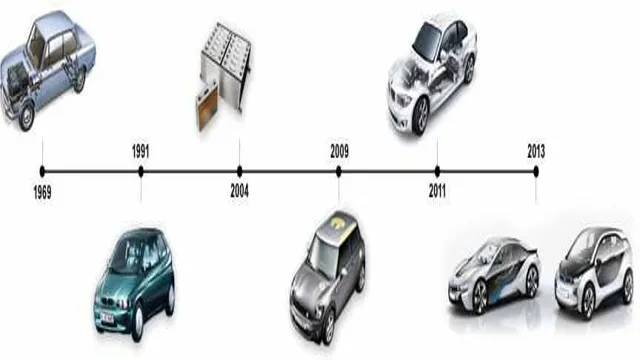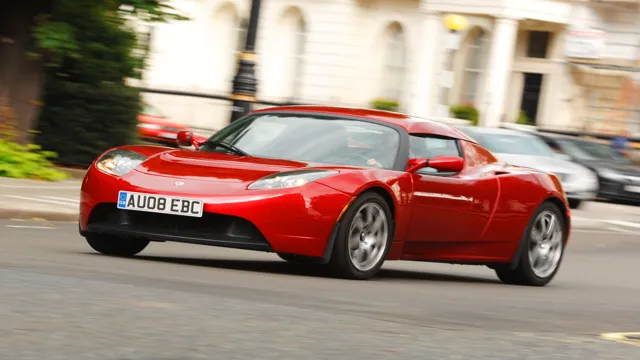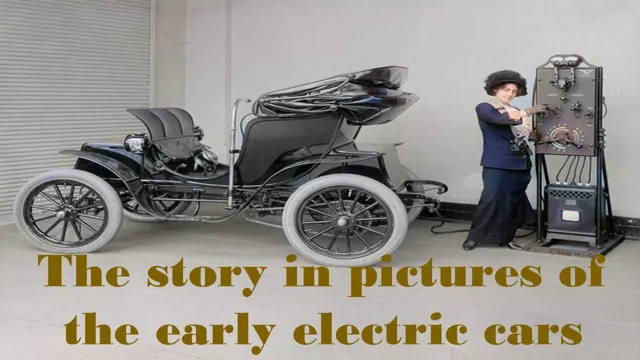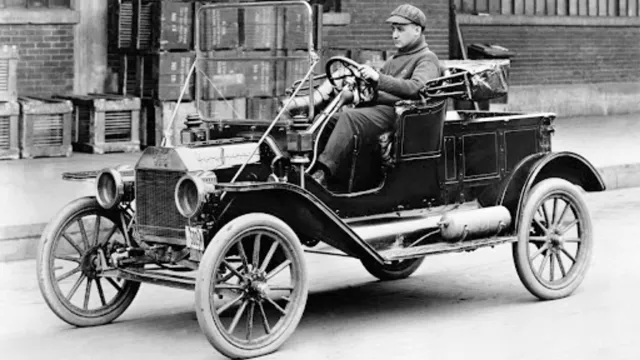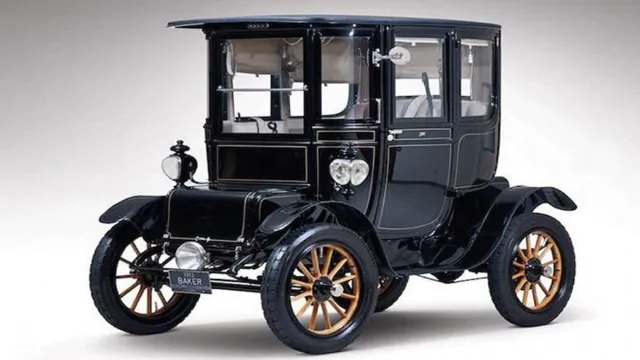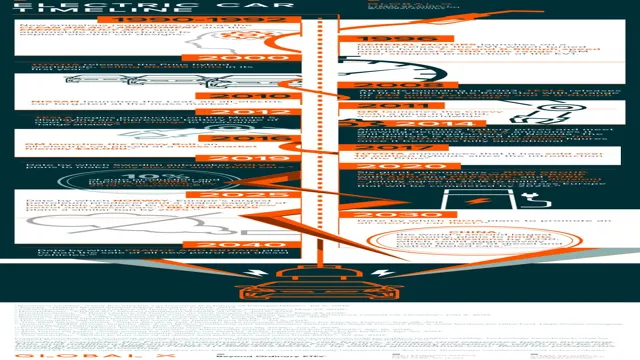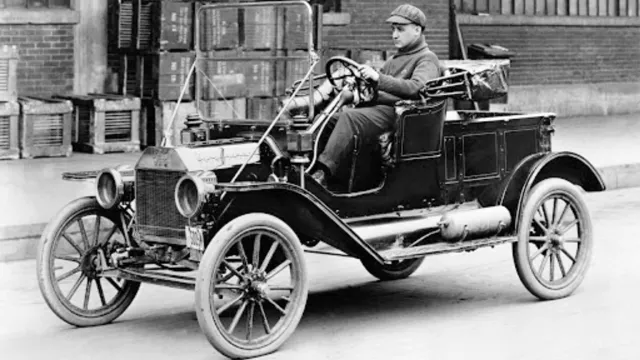The Groundbreaking Evolution of BMW Electric Cars: A Look Back at Their Remarkable History
When it comes to luxury electric vehicles, BMW has been a front-runner in the industry for quite some time. From the i3 to the i8, BMW has consistently delivered electric cars that combine sleek design, impressive performance, and eco-friendly innovation. But where did it all begin for BMW’s electric car history? Let’s take a closer look at the evolution of BMW’s electric cars and how they have shaped the future of the automotive industry.
Early Innovations in Electric Cars
BMW has always been a trailblazer in the electric car industry since the early 1970s. Their first electric vehicle was the BMW 1602 Electric, which was powered by a 32kW motor and could travel up to 37 miles on a single charge. Although this car did not have a long range, it sparked BMW’s passion for creating innovative electric cars.
In 2013, BMW’s i-series was launched, consisting of the BMW i3 and i The i3 was BMW’s first mass-produced, fully electric car, while the i8 was a plug-in hybrid sports car. The i3 was equipped with a 22kWh lithium-ion battery pack, which allowed the car to travel up to 81 miles on a single charge.
Through its many electric car innovations, BMW has demonstrated that they are committed to making electric vehicles more accessible to the public.
BMW’s First Electric Car
When it comes to electric cars, BMW has been a pioneer in the industry for quite some time. One of their earliest innovations in this technology was the BMW i3, marketed as their first all-electric car. This model was designed to be compact in size, making it ideal for city driving.
The i3 was powered by a lithium-ion battery that could be charged in just a few hours, giving it a range of between 80 to 100 miles. This was a remarkable feat at the time, given that many other electric cars could only manage half of that distance. Additionally, the i3 featured a unique design that incorporated lightweight materials such as carbon fiber, aluminum, and recycled plastics.
This helped to make it more energy-efficient than its competitors while still maintaining a high level of performance. Overall, the BMW i3 was a significant milestone in the development and evolution of electric cars.
BMW’s Contribution to Electric Car Technology
BMW has been at the forefront of electrification in the automotive industry for a while now. In fact, they have been contributing to the development of electric cars since their first electric car, the BMW i3, was launched in 201 But BMW’s expertise in electric cars goes back even further than that – all the way to the Late 1970s when the company developed an experimental electric car, the BMW 1602 Electric.
This car had advanced features for its time, such as regenerative braking and a fast charger. BMW’s contribution to electric car technology has only gotten more significant over the years. Today, they offer a range of electric cars with extended battery ranges, intelligent charging solutions, and innovative features like the eDrive system, which combines a traditional internal combustion engine with an electric motor for maximum efficiency.
One thing is for sure – BMW is not slowing down when it comes to developing and improving electric cars.
Current Models of BMW Electric Cars
BMW has a rich history with electric cars, and they have been a pioneer in this field since the early 70s. In recent years, BMW has focused on creating high-performance electric cars that not only surpass their gas-guzzling counterparts in terms of speed and torque but are also eco-friendly. Their current models of electric cars include the BMW i3, which is a four-door electric car that has a range of up to 153 miles on a single charge.
The BMW i8 is a sleek and sporty sports car that boasts a top speed of 155 mph and can go from 0 to 60 mph in just 2 seconds. BMW has also introduced a range of plug-in hybrid models, including the BMW 330e, BMW 530e, and BMW 745e, which allows for more flexibility for those who may not be ready to entirely embrace electric cars yet.
With BMW’s focus on creating sustainable cars that don’t sacrifice performance, we can expect to see even more groundbreaking electric cars from them in the future.
BMW i3 and i3s
BMW i3 and i3s are the current models of BMW electric cars. These cars are designed to meet the needs of people who want to reduce their carbon footprint and drive a vehicle that is both environmentally friendly and luxurious. The i3 and i3s are both fully electric cars, which means that they run entirely on electricity and produce no emissions.
These cars come equipped with all of the latest technology and features that you would expect from a BMW, including a sleek and modern design, advanced safety features, and a comfortable interior. The i3s is a more powerful version of the i3, with a sporty look and feel that will appeal to drivers who want a little more excitement in their ride. Overall, the BMW i3 and i3s are excellent options for anyone who wants to drive an electric car that provides all of the performance and luxury of a traditional BMW.
BMW i8 Coupe and i8 Roadster
The BMW i8 Coupe and i8 Roadster are two of BMW’s current electric car models. The i8 Coupe is a sleek, sporty two-door car, while the i8 Roadster offers an open-air driving experience with its retractable soft-top roof. Both models boast a hybrid powertrain that includes a
5-liter three-cylinder gasoline engine and an electric motor, providing a combined 369 horsepower. The i8 also has a range of up to 18 miles in pure electric mode and can go from 0 to 60 mph in just 2 seconds.
With their futuristic styling and impressive performance, the BMW i8 Coupe and i8 Roadster offer a thrilling driving experience that is sure to impress. If you are in the market for an electric car that combines performance and style, the BMW i8 Coupe and i8 Roadster are definitely worth considering.
BMW X5 xDrive45e Plug-In Hybrid
BMW electric cars BMW continues to expand its lineup of electric cars, and the latest addition is the BMW X5 xDrive45e plug-in hybrid. This SUV offers an impressive all-electric range of 31 miles, thanks to its 24-kWh battery pack. The car features a
0-liter six-cylinder engine paired with an electric motor, providing a combined output of 389 horsepower and 443 pound-feet of torque. The car can go from 0-60mph in just 3 seconds, making it one of the fastest EVs in the market.
The X5 xDrive45e offers various driving modes that allow you to switch between all-electric, hybrid, and gasoline-only modes, depending on your preferences. It’s not only practical but also efficient, with an estimated MPG of 50. If you are in the market for a luxury SUV that is both eco-friendly and performance-oriented, then the BMW X5 xDrive45e plug-in hybrid is worth considering.
Future of BMW Electric Cars
BMW has been a key player in the electric car industry for over a decade. The company’s electric vehicle history dates back to 2009 when the BMW i3 was released, ushering in a new era of eco-friendly, high-tech cars. Since then, BMW has continued to innovate and improve its electric car offerings, with the BMW iX3 and the upcoming BMW i4 both garnering significant attention.
The BMW i4, set to be released in 2021, is particularly exciting, as it’s expected to have a range of up to 373 miles on a single charge and an acceleration time of just four seconds to reach 62 mph. As the automotive industry continues to shift towards electric vehicles, BMW is poised to remain at the forefront of this trend, producing sleek, high-performance cars that are both environmentally friendly and fun to drive.
Next-Generation Battery Technology
The future of BMW electric cars is looking bright, thanks to the next-generation battery technology. The German automaker has worked tirelessly to improve the efficiency, range, and charging time of their electric vehicles. They recently announced that they are working on a new solid-state battery that could have double the energy density of conventional lithium-ion batteries.
This means that their electric cars could have a longer range, be lighter, and charge faster than ever before. The new battery will also be safer and more stable, as it uses solid materials rather than liquid electrolytes. This could revolutionize the electric car industry and make the adoption of electric vehicles even more attractive to consumers.
With this cutting-edge technology, BMW is paving the way for a sustainable future and proving that electric cars can be just as practical and reliable as their gasoline counterparts.
Plans for All-Electric Models
If you’re a fan of electric cars, you’d be pleased to know that BMW has some exciting plans for their all-electric models. The German automaker has already made significant strides in the electric car market with their i series, the i3 and the i8, both of which showcase modern design and excellent performance. But BMW isn’t stopping there; they have announced that by the end of 2021, they will have five fully electric models on the market, with 25 electrified models set to be launched by 202
That’s an impressive feat, and it shows that BMW is committed to developing their electric car technology and increasing their presence in the electric car market. With all this in mind, it seems that the future of BMW electric cars is looking brighter than ever.
Conclusion: BMW’s Commitment to Electric Cars
In conclusion, the history of BMW’s electric cars is one of innovation, experimentation and pioneering spirit. From early experiments with electric tech in the 1970s, through to the modern day i-series models, BMW has consistently pushed the boundaries of what’s possible with electric vehicles. With a firm commitment to sustainability and eco-friendliness, BMW is leading the charge for a greener future on our roads.
So let’s raise a toast to BMW, the company that’s providing us with both power and performance, all while keeping the planet in mind. Truly, BMW’s vision for electric cars is electrifying!”
FAQs
What is the history of BMW in producing electric cars?
BMW began its journey towards electric cars with the launch of the i3 in 2013. Since then, they have continued to develop and innovate with electric vehicle technology.
How does BMW’s electric car technology compare to other manufacturers?
BMW’s electric vehicles are known for their advanced technology and high-performance capabilities. With the i3 and i8, BMW has become a leading manufacturer in the electric car industry.
Can BMW’s electric cars travel long distances on a single charge?
Yes. BMW’s i3 and iX3 electric cars have a range of up to 260 and 285 miles respectively on a single charge, making them a practical option for long journeys.
What is the price range for BMW’s electric cars?
BMW’s electric cars range in price from around $45,000 for the i3 to upwards of $65,000 for the iX3 and i8. Despite being more expensive than gasoline-powered vehicles, the low cost of charging and maintenance make them a cost-effective option over time.

